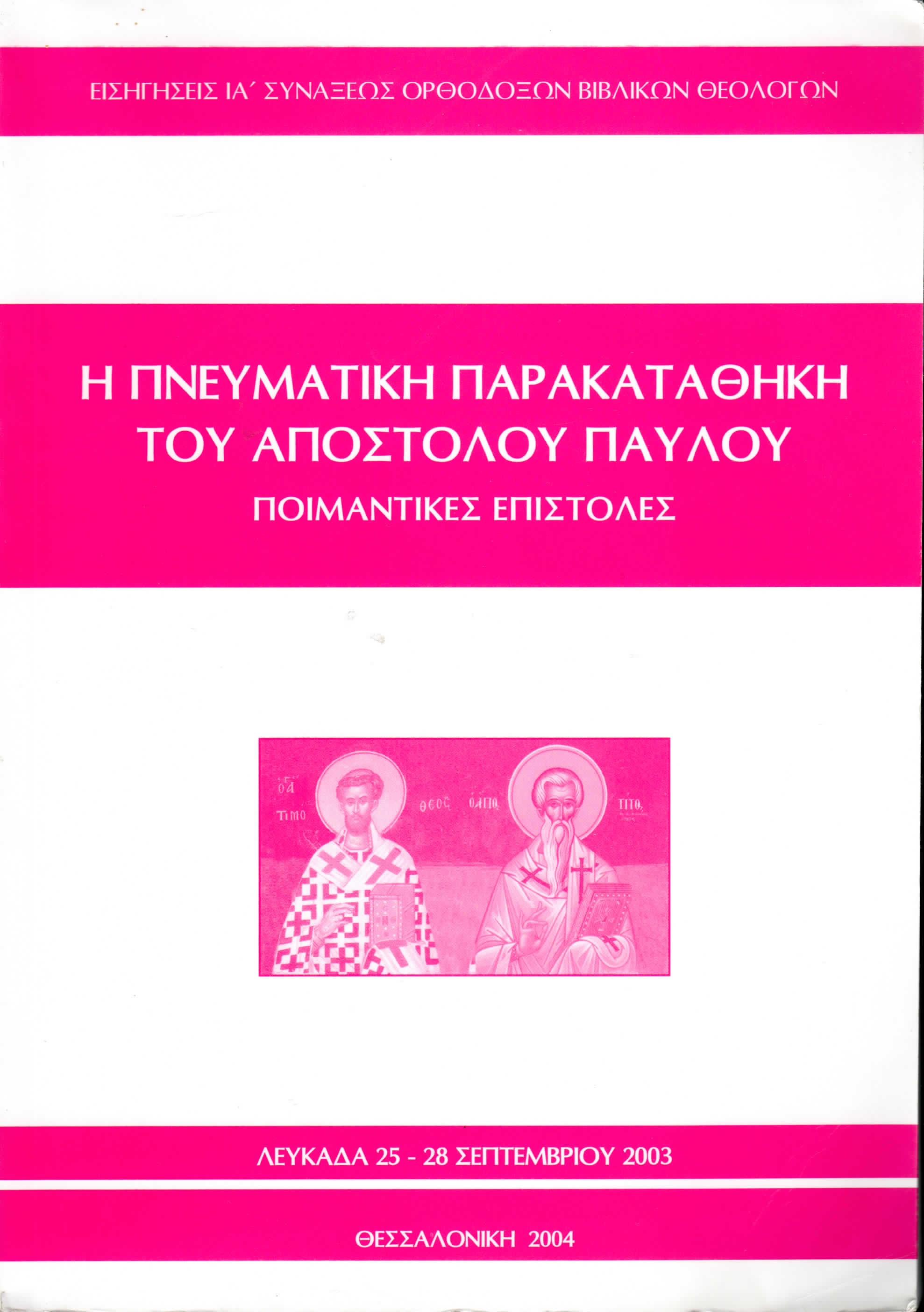Volumes of collections of essays which are entirely about the Pastorals (in whole or in part) are not common. Until a year or so ago, I was only aware of six:
Bieringer, Reimund, ed. 2 Timothy and Titus Reconsidered / Der 2. Timotheus- und der Titusbrief in neuem Licht. Colloquium Oecumenicum Paulinum 20. Leuven: Peeters, 2018.
de Virgilio, Giuseppe, ed. Il deposito della fede: Timoteo e Tito. Supplementi alla Rivista Biblica 34. Bologna: Dehoniane, 1998.
Donfried, Karl Paul, ed. 1 Timothy
Reconsidered. Colloquium Oecumenicum Paulinum 18. Leuven: Peeters, 2008.
Köstenberger, Andreas J. and Terry L. Wilder, eds. Entrusted with the Gospel: Paul’s Theology in the Pastoral Epistles. Nashville: B&H, 2010.
Köstenberger, Andreas J. and Thomas R. Schreiner, eds. Women in the Church: An Interpretation and Application of 1 Timothy 2:9–15. 3rd ed. Wheaton, IL: Crossway, 2016.
Weidemann, Hans-Ulrich, and Wilfried Eisele, eds. Ein Meisterschüler: Titus und sein Brief. Michael Theobald zum 60. Gerburtstag. Stuttgarter Bibelstudien 214. Stuttgart: Katholisches Bibelwerk, 2008.
I was pleased to discover another, a privately printed volume of scholarly presentations from an academic conference on the Pastorals held in Thessaloniki in 2003: Ἡ πνευματική παρακαταθήκη τοῦ Ἀποστόλου Παύλου. Ποιμαντικές Ἐπιστολές [The Spiritual Depository of Paul the Apostle: Pastoral Epistles]. Εἰσηγήσεις ΙΑ´ Συνάξεως Ὀρθοδόξων Βιβλικῶν Θεολόγων: Λευκάδα 25–28 Σεπτεμβρίου 2003 (Thessaloniki: privately published, 2004). A couple of the essays are in English, but most are in Modern Greek (though a number of those have English-language summaries included). The essays are all written by authors who are Orthodox, though not all of them are self-consciously treating the letters from that perspective.
My profound thanks goes to Christos Karakolis, without whose help I would not have been able to obtain this work. Christos is a professor of New Testament at the National and Kapodistrian University of Athens, and has an essay included in the volume. He graciously provided me a copy of the volume, and assisted with the English translation of the table of contents.
I provide below a list of the essays included in the volume, most of which are well-nigh impossible to obtain through standard channels. Though it would be inappropriate for me to post the entire volume online, researchers in the Pastorals may obtain specific essays on a personal basis for research purposes; email me at chuckbumgardner at gmail.com with your request.
__________________
Agouridis, Savvas (Σαββας
Αγουριδης). “Η φύση της αίρεσης
που καταπολεμούν οι ποιμαντικές επιστολές [The nature of the sect fought
by the Pastoral Epistles].” Pages 31–40.
Atmatzidis, Charalampos (Ατματζιδης,
Χαραλαμπος). “Οι ηθικές προτροπές
για τον πλούτο και τους πλουσίους στο Α’ Τιμ. 6 και η Καινοδιαθηκική ηθική
[The ethical exhortations regarding wealth and the wealthy in 1 Tim. 6 and the
ethics of the New Testament].” Pages 41–84. [English-language summary on p. 84]
Vassiliadis, Petros (Βασιλειαδης,
Πετρος). “Μετανεωτερικότητα, σταυρική
θεολογία και οι συνέπειές τους για τις ποιμαντικές επιστολές
[Postmodernity, theologia crucis, and their consequences for the Pastoral
Epistles].” Pages 85–100. [English-language summary on pp. 99-100]
Galanis, Ioannis (Γαλανης,
Ιωαννης). “Η χρήση των ποιμαντικών
επιστολών στα έργα των εκκλησιαστικών συγγραφέων της ανατολικής εκκλησίας
[The use of the Pastoral Epistles in the works of ecclesiastical writers in the
Eastern Church].” Pages 101–12.
Galitis, Georgios A. (Γαλιτης,
Γεωργιος). “Οι ποιμαντικές
επιστολές στη σύγχρονη έρευνα [The Pastoral Epistles in modern
research].” Pages 113–30.
Despotis, Sotirios (Δεσποτης,
Σωτηριος). “Η Χριστολογία των
Ποιμαντικών Επιστολών [The Christology of the Pastoral Epistles].” Pages
131–50. [English-language summary on pp. 148–49]
Doikos, Damianos (Δοϊκος,
Δαμιανος). “‘Χήρας τίμα τάς όντως
χήρας’ (Α’Τιμ.5,3-16).”
Pages 151–62.
Ioannidis, Thomas (Ιωαννιδης,
Θωμας). “Οι ύστεροι καιροί και οι έσχατες ημέρες στις Α’
και Β’ προς Τιμόθεον επιστολές [The end of all times and the last days
in the First and Second Epistles to Timothy].” Pages 163–92. [English-language
summary on pp. 189–91]
Karavidopoulos, Johannes (Καραβιδοπουλος,
Ιωαννης). “Η σωτηριολογία των
ποιμαντικών επιστολώ [The soteriology of the Pastoral Epistles].” Pages
193–204. [English-language summary on p. 203]
Karakolis, Christos (Καρακολης,
Χρηστος). “‘Λέγοντες την ανάστασιν
ήδη γεγονέναι’ (Β΄ Τιμ. 2,18):
Ερμηνευτική, συγκριτική και θεολογική
θεώρηση μιας εσχατολογικής παρεκτροπής [‘Saying that the resurrection
has already happened’ (2 Timothy 2:18): Exegetical, comparative and theological
view of an eschatological deviation].” Pages 205–24.
Kirov, Dimitar Popmarinov. “Godlessness according to 2
Timothy 3.1–9 and Ps. 13(14). Some biblical and theological attitudes in the
light of the situation in a postcommunist country.” Pages 225–40.
[Greek-language summary on pp. 238–40]
Koltsiou-Nikita, Anna (Κόλτσιου-Νικήτα,
Άννα). “To ‘κάτοπτρον επισκόπου’
στις ποιμαντικές επιστολές και το γραμματειακό του πλαίσιο [The ‘mirror
of the bishop’ in the Pastoral Epistles and its literary context].” Pages
241–64. [German-language summary on p. 264]
Mihoc, Vasile. “The Mission in the Pastoral Letters.” Pages
265–86. [Greek-language summary on pp. 284–85]
Nikolakopoulos, Constantine (Νικολακοπουλος,
Κωνσταντινος). “Επόψεις της
‘Παυλείου’ ρητορικής στις δυο προς Τιμόθεον επιστολές [Aspects of
‘Pauline’ rhetoric in the two letters to Timothy].” Pages 287–304
Papademetriou, Kyriakoula (Παπαδημητριου,
Κυρiακουλα). “Η σημασιολογία της
λ. υγιαίνω στις ποιμαντικές επιστολές [The semantics of the word υγιαίνω
in the Pastoral Epistles].” Pages 305–34. [English-language summary on p. 333]
Paparnakis, Athanasios (Παπαρνακης, Αθανασιος). “‘’Από βρέφους τά ιερά γράμματα οίδας’ (Β’ Τιμ. 3,15). Η θρησκευτική αγωγή του παιδιού στον ιουδαϊσμ [‘From childhood you have been acquainted with the sacred writings’ (2 Tim 3:15). Religious education of children in Judaism].” Pages 335–60. [English-language summary on p. 360]
Sakkos, Stergios N. (Σακκος, Στεργιος Ν.). “Ενα εκκλησιαστικο αξιωμα για τη γυναικα (Α’ Τιμ. 5,3–16) [An ecclesiastical office for women (1 Tim 5:3–16)].” Pages 361–85.




